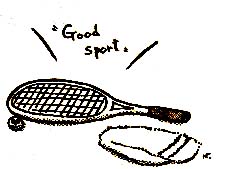PRACTICE
THIS WEEK
(November 04, 2000)
[Discussion]Å@ "Sports" Å@(J.Amano)
 It's never been easy for me to be a ''good
sport". A "good sport" is someone who
doesn't get mad when they lose a game. Someone who keeps
trying to do their best even when things aren't going so
well. I suppose a good sport is someone who believes, as
the popular saying goes, "it's not whether you win
or lose, but how you play the game."
It's never been easy for me to be a ''good
sport". A "good sport" is someone who
doesn't get mad when they lose a game. Someone who keeps
trying to do their best even when things aren't going so
well. I suppose a good sport is someone who believes, as
the popular saying goes, "it's not whether you win
or lose, but how you play the game."
When I started playing squash a few years ago, the
biggest challenge for me was not the game itself, but my
attitude. I lterally felt sick if I lost an important
game. Or if I started losing half way through, I would
feel so discouraged, I would just give up on trying to
win. When I realized playing wasn't fun anymore, I
decided I had to work on mental training. I really wanted
to become a good sport. I started concentrating more on
having a good time and on learning something positive
from my mistakes. Like one famous squash player said,
"you always learn something, especially when you
lose." I also began to learn a lot from watching
other people play.
I don't know what Japanese children are taught about
mental attitude in sports, but I'm always amazed when I
watch good players in Japan play squash. Occasionally
someone will yell out or argue with the referee, but
generally, Japanese players are fairly quiet and
controlled. They seem to concentrate on heir technique
and fight to the end, even when the score is 0-9.
Watching that kind of playing has really inspired me to
be a better sport as well.
So the first time I went to the Japan Open, where some of
the world's top players come, I experienced extreme
culture shock. Among many of the European and American
players, the idea of "the good sport" seemed to
have no meaning at all. Both women and men screamed at
the referees, used bad language on he court, threw down
their rackets when they lost and left the court in anger.
I'll never forget one woman who even hit her head against
the wall over and over when she missed shots.
I wondered how a person could lose their temper on the
court and still play he game well. But to my surprise,
the most emotional players often won. In fact, very few
of he Japanese players ever make it to the finals. That
means the final day of the tournament is quite a display
of wild emotions by the mostly European players.
Squash players in Japan often discuss why Japanese
players don't win in international tournaments. Is it
because squash  is still a fairly new sport here? Or could it be
that technique is emphasized too much? Maybe squash
school coaches expect too much conformity among their
students. I can remember my own frustration once when it
felt more natural to turn to the left after a shot, but
the coach insisted that everyone turn to the right. If
players were encouraged to show more passion and
personality on the court would their individual strength
come out more?
is still a fairly new sport here? Or could it be
that technique is emphasized too much? Maybe squash
school coaches expect too much conformity among their
students. I can remember my own frustration once when it
felt more natural to turn to the left after a shot, but
the coach insisted that everyone turn to the right. If
players were encouraged to show more passion and
personality on the court would their individual strength
come out more?
I don't know the answers. But what I do know is that, for
me, being a good sport feels a lot better than being a
bad sport. And my squash heroes are not the ones who win
in a great passion, but rather the ones who play the game
with dignity and grace, with a fighting spirit up to the
last point. That's the kind of "winner" I want
to be, especially when I lose.
Please come to
this ESS and let's talk about the subject together !
Return
It's never been easy for me to be a ''good sport". A "good sport" is someone who doesn't get mad when they lose a game. Someone who keeps trying to do their best even when things aren't going so well. I suppose a good sport is someone who believes, as the popular saying goes, "it's not whether you win or lose, but how you play the game."
is still a fairly new sport here? Or could it be that technique is emphasized too much? Maybe squash school coaches expect too much conformity among their students. I can remember my own frustration once when it felt more natural to turn to the left after a shot, but the coach insisted that everyone turn to the right. If players were encouraged to show more passion and personality on the court would their individual strength come out more?